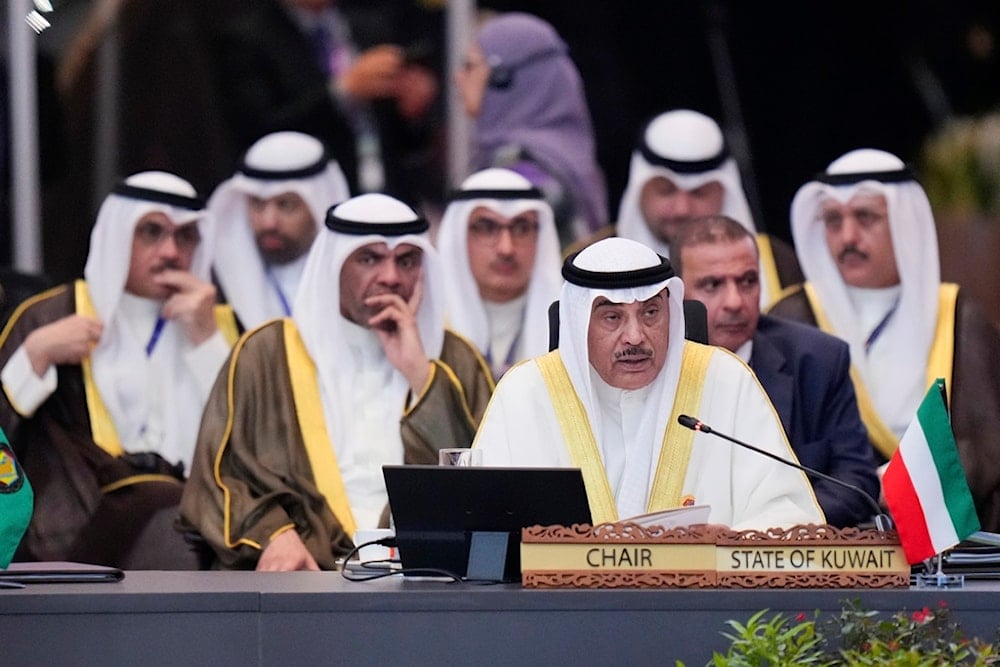GCC leaders meet in Doha after Israeli attack, eye joint defense
Gulf leaders in Doha discussed activating GCC joint defense after the Israeli strike on Qatar, underscoring regional security concerns.
-

Kuwait's Crown Prince Sheikh Sabah Khalid Al Sabah, speaks during the 2nd ASEAN-Gulf Cooperation Council (GCC) Summit after the Association of Southeast Asian Nations (ASEAN) Summit in Kuala Lumpur, Malaysia, Tuesday, May 27, 2025. (AP)
Gulf Cooperation Council (GCC) leaders held an extraordinary meeting in the Qatari capital on Monday to discuss potential responses following the Israeli strike on Doha, according to a statement released after the talks.
The statement said the meeting aimed to consider “appropriate responses” and urged steps to activate the GCC’s joint defense mechanisms, though it did not provide further details. The gathering took place on the sidelines of the Arab-Islamic summit held Sunday and Monday, where Qatar’s Emir Sheikh Tamim bin Hamad Al Thani pledged that his country “will do whatever is necessary, taking practical and firm steps permitted under international law.”
The GCC’s Joint Defense Council, established in 1981, is one of the bloc’s key institutions. Comprising the defense ministers of the six member states, Bahrain, Kuwait, Oman, Qatar, Saudi Arabia, and the United Arab Emirates, it serves as the council’s highest military authority.
The body coordinates defense policies among member states and works to strengthen collective military cooperation, positioning itself as the GCC’s main security arm. Monday’s meeting underscored growing regional concern over security after the unprecedented attack on Qatar, as leaders considered how to enhance deterrence and safeguard Gulf stability.
Arab-Islamic summit condemns Israeli strike on Qatar
Leaders from across the Arab and Islamic world gathered in Doha on Monday for an emergency summit on what they described as “a reckless Israeli attack” targeting a senior Hamas delegation in the Qatari capital. Speakers at the meeting denounced the strike, warned of mounting regional danger, and called for a united front to stop further escalation.
Qatar’s Emir, Sheikh Tamim bin Hamad Al Thani, told delegates that Israeli Prime Minister Benjamin Netanyahu sought to “turn the Arab region into an Israeli sphere of influence,” noting that the latter had recently declared that “a Palestinian state will never be established.” Sheikh Tamim vowed that Qatar “will take all necessary, practical and firm steps permitted under international law.”
Arab League Secretary-General Ahmed Aboul Gheit said the assault on Doha “exceeded every limit.” He added, “The attack on civilians and negotiators is vile and cowardly, and boasting about it reflects an abyss of moral collapse.” He warned that “silence over crimes in Gaza has led the occupation to believe every act is possible.”
Arab, Islamic countries meet to discuss strike
Arab and Islamic foreign ministers on Sunday declared that Qatar’s security is “an integral part of Arab and Islamic national security,” during a closed-door meeting in Doha ahead of an extraordinary Arab-Islamic summit set for Monday to address the Israeli assault on Qatar.
According to participants, the ministers stressed that the Israeli strike on Doha represented a breach of international law and a dangerous escalation threatening Arab, regional, and international stability.
Qatar’s Foreign Ministry spokesperson, Majed al-Ansari, said the summit reflects broad Arab and Islamic solidarity with Doha and underscores the firm rejection of what he described as state terrorism practiced by the Israeli regime. He added that Monday’s emergency summit would discuss a draft statement on the Israeli aggression, prepared during Sunday’s ministerial session.

 3 Min Read
3 Min Read










